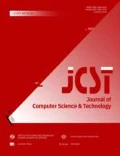Abstract
A multi-class macro-scheduler is described in this paper. The scheduler periodically determines the number of jobs from each class that should be activated to minimize a weighted sum of the mean system residence time without saturating the system. The computation is based on the estimated system workload in the next interval. Thus it is adaptive to workload variation. The service provided to each class (specifically, the mean response time) may be adjusted by changing the weight associated with the job class.
The scheme is based on mathematical modelling. The solution is obtained through the use of queuing theory, operational analysis and optimization theory. Exponential smoothing technique is employed to reduce the error of estimating the value of the model parameters. Simulation results show the scheme to be both stable and robust. Performance improvement over some of the existing schemes (the 50%, L=S and the Knee criteria) is significant under some workloads. The overhead involved in its implementation is acceptable and the errors due to some of the assumptions used in the formulation and solution of the model are discussed.
Similar content being viewed by others
References
S. Chanson and P. Sinha, Adaptive Load Control in Batch-Interactive Computer Systems, Proc. of 16th Computer Performance Evaluation Users Group Conference, Orlando, Fla, Oct. 1980, 207–213.
M. Badel, E. Gelenbe, J. Leroudier and D. Potier, Adaptive Optimization of a Time-Sharing System's Performance, Proc. of IEEE, Vol. 63 (1975), 958–965.
M. Badel and J. Leroudier, Adaptive Multiprogramming Systems Can Exist, in Performance of Computer Installations. Edited by D. Ferrari, North-Holland, Amsterdam, 1978, 115–135.
P. Denning, K. Kahn, J. Leroudier, D. Potier and R. Suri, Optimal multiprogrammingActa Informatica,7: 2 (1976), 197–216.
C. Landwehr, An Endogenous Priority Model for Load Control in a Combined Batch-Interactive Computer System, Proc. of Int'l Symp. on Comp. Perf. Modelling. Meas. and Eval. March 1976, 282–293.
J. Leroudier and D. Potier, Principles of Optimality for Multiprogramming, Proc. of Int'l Symp. on Comp. Perf. Modelling, Meas. and Eval. March 1976, 211–218.
E. Gelenbe, A. Kurinckx and I. Mitrani, The Rate Control Policy for Virtual Memory Management, in Operating Systems: Theory and Practice, Edited by D. Lanciaux, North-Holland, Amsterdam, 1979, 247–264.
E. Gelenbe and A. Kurinekx, Random Injection Control of Multiprogramming in Virtual Memory,IEEE Trans. on Software Engineering,4:1 (1978), 2–17.
G.S. Graham and P. Denning, On the Relative Controllability of Memory Policies, Proc. of Int'l Symp. on Comp. Perf. Modelling, Meas. and Eval., August 1977, 411–428.
A. Geck, Performance Improvement by Feedback Control of the Operating System, in Performance of Computer Systems Edited by M. Arato, A. Butrimenko and E. Gelenbe, North-Holland, Amsterdam, 1979, 459–471.
H. Brandwajn and J. Hernandez, A Study of a Mechanism for Controlling Multiprogrammed Memory in an Interactive System, in Performance of Computer Systems, Edited by M. Arato, A. Butrimenko and E. Gelenbe, North-Holland. Amsterdam, 1979, 487–500.
P. Krtizinger, A. Krzesinski and P. Teunissen, Design of a Control System for a Timesharing Computer System, in Performance of Computer Installations, Edited by D. Ferrari, North-Holland, Amsterdam, 1978, 103–114.
P. Denning and K. Kahn, An L=S Criterion for Optimal Multiprogramming Proc. of Int'l Symp. on Computer Perf. Modelling, Meas. and Eval., March 1976, 219–229.
A.J. Shils, The Load Leveler, IBM Research Report RC 2233, Oct. 1968.
S. Chanson, Saturation Estimation in Interactive Computer Systems,INFOR,21:1 (1983), 1–19.
S. Chanson and R. Lo. The Application of Optimal Stochastic Control Theory in Computer Load Regulation, Technical Report 81-5, Dept. of Computer Science, University of British Columbia, June 1981.
A. Schonbach. Macro-Scheduler for High Productivity, Ph.D. Thesis, Dept. of Computer Science, University of Toronto, 1980.
P. Denning and J. Buzen, The operational analysis of queuing network models,Computing Surveys,10:3 (1978), 225–261.
J. Buzen, Computational algorithms for closed queuing networks with exponential servers,Comm. ACM,16:9 (1973), 527–531.
M. Reiser and S. Lavenberg, Mean-Value Analysis of Closed Multiclass Queuing Network,Journal ACM,27:2 (1980), 313–322.
L. Kleinrock, Certain Analytic Results for Time-Shared Processor, Info. Processing, Proc. IFIP Congress, 1968, 838–845.
L. Belady and C. Kuehner, Dynamic space sharing in computer system,Comm. ACM,12:5 (1969), 282–288.
D. Chamberlin, S. Fuller and L. Liu, An analysis of page allocation strategies for multiprogramming systems with virtual memory,IBM J. of Research and Development,17:5(1973), 404–412.
P. Sinha, Optimization Techniques in Computer System Design and Load Control, Ph. D. Thesis, Dept. of Computer Science, University of British Columbia. 1981.
S. Chanson and P. Sinha, Optimization of memory hierarchies in multiprogrammed computer systems with fixed cost constraint,IEEE Trans. on Computers,29:7, 611–618.
S. Chanson and C. Bishop, A Simulation Study of Adaptive Scheduling Policies in Interactive Computer Systems, Proc. of Winter Simulation Conference, Gaithersburg, Maryland, Dec. 1977, 634–641.
J. Hine, I. Mitrani and S. Tsur, The control of response times in multiclass systems by memory allocation,Comm. ACM,22:7 (1979), 415–423.
M. Kendall, Time Series, Griffin, London, 1976.
Y. Bard, Some Extensions to Multiclass Queuing Network Analysis, Proc. of 4th Int'l Symp. on Modelling and Performance Evaluation of Computer Systems, Vienna, Feb. 1979, 51–62.
IBM OS/VS2 MVS System Programming Library: Initialization and Tuning Guide, GC28-0681, May 1978.
H. Kameda, Effects of job loading policies for multiprogramming systems in processing a job stream,ACM Trans. on Computer Systems,4:1 (1986), 71–106.
Author information
Authors and Affiliations
Additional information
This work was supported by the Natural Sciences and Engineering Research Council of Canada under grant A3554.
Rights and permissions
About this article
Cite this article
Chanson, S.T., Sinha, P.S. A feedback macro-scheduler. J. of Comput. Sci. & Technol. 4, 255–274 (1989). https://doi.org/10.1007/BF02943541
Received:
Issue Date:
DOI: https://doi.org/10.1007/BF02943541



